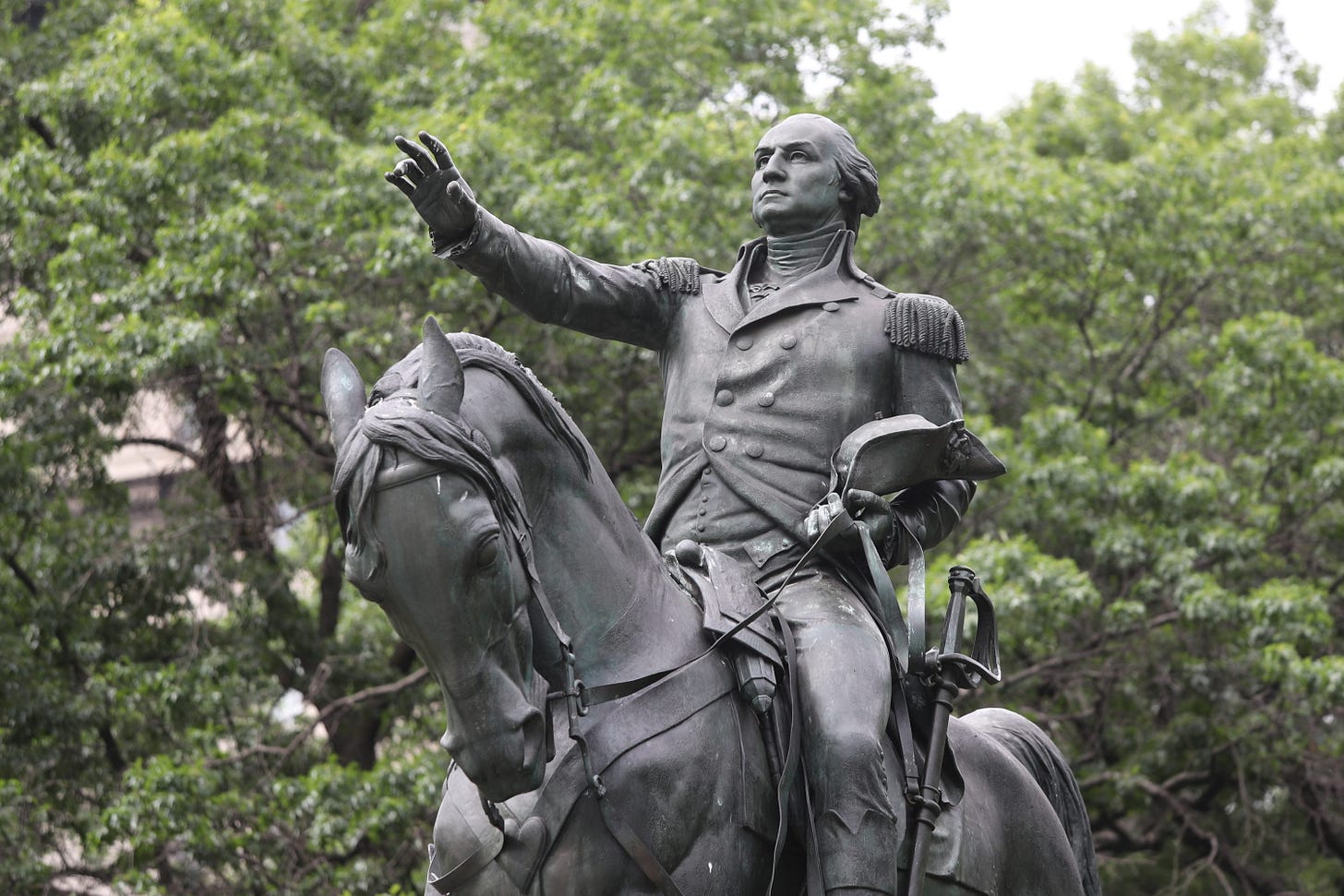We Need ‘Dad History’ to Help Understand Our Monuments
The civic value of high-quality, eminently readable history.

The monuments are coming down indiscriminately now. What started with Confederates and continued with Columbus has moved on to George Washington, who, though a slave owner, was instrumental in founding the nation, and Ulysses S. Grant, who led the military victory that preserved the nation and ended slavery.
We need a broad public understanding of our nation’s past military and political leaders, the historical context in which they lived, how they succeeded, how they failed, and what their legacy should be. Only then can we make informed decisions about how best to commemorate the past.
All too often, however, military and political histories for general readers are dismissed as “Dad History,” after the popularity of such subjects among middle-aged men. That attitude is a problem.
According to critics, Dad History is written in a celebratory tone by white men for white men about white men. It cares only about themes of leadership, the greatness of statesmen, and war (some wars much more than others). Dad History allegedly crowds out other topics, conceals the work of non-white male authors, and leaves the impression that history writing is supposed to glorify America. Sometimes, Dad History can seem downright ridiculous, as in the pattern of George Washington biographers conspicuously discussing his massive thighs, as a recent author noted.
The criticism of Dad History has a point. For many years, traditional topics like politics and war were usually written by white men for readers who looked like them, and history publishing has been fertile ground for books that smooth over the ugly reality of the past.
Some bestselling Dad Histories miss the mark. David McCullough’s The Pioneers: The Heroic Story of the Settlers Who Brought the American Ideal West, for example, was rightly criticized on publication last year for the way McCullough truncated his cast of characters to exclude the Native Americans his heroic pioneers displaced. Joseph Ellis churns out Founding Fathers books so frequently it is hard to tell them apart. Meanwhile, the less said about Bill O’Reilly’s “Killing [X]” series, now nine volumes strong, the better.
To see these books as representative of all Dad History is wrong, however. Even among books published for general readers, McCullough, Ellis, and O’Reilly occupy only a portion of a store’s shelves. They hardly have a monopoly on traditional subjects.
Political and military history publishing is alive and well. In my own field of early America, I think immediately of recently published books by Serena Zabin on the Boston Massacre; Lindsay Chervinsky on President Washington’s cabinet; Erica Armstrong Dunbar on Ona Judge, an enslaved woman who ran away from Washington; Joanne Freeman on congressional violence and the road to the Civil War; and Megan Kate Nelson on the Civil War in the West.
Notice that these historians are all women. People from many different backgrounds write great books on traditional subjects. And even if contemporary authors don’t confine themselves to chronicling the public deeds of great men, they do offer enough political scheming, hard-won battles, and reflections on the nature of leadership to satisfy even the crustiest old history-reading dad.
The most troubling part of putting down Dad History is that it insults readers, people who want to learn something about the past and who happen to have tastes different from the gatekeepers of elite culture.
Take the biography of Grant by Dad History mainstay Ron Chernow. Someone who read the book or watched the recent History Channel documentary series it inspired would know the complexity of Grant’s experience with slavery. Raised in an anti-slavery family, Grant married into a slave-owning one and often found himself harried by both his father and his father-in-law for being too much influenced by the other side.
For a time, Grant managed the enslaved workers at his father-in-law’s plantation and himself owned a man, whom he emancipated in 1859. Grant was no abolitionist, but as president he pushed forward Reconstruction and fought the emergent Ku Klux Klan.
Maybe Grant doesn’t deserve a statue—as president, his policy toward Native Americans was hardly praiseworthy. But he doesn’t deserve to be lumped in with the Confederates he defeated, either. Good history, of whatever kind, teaches that kind of discernment.
Dad History is the kind of history most Americans find accessible enough to read. Instead of being criticized, high-quality Dad History should be hailed for what it is: a crucial way to learn and to inform our civic debates and public understanding.

